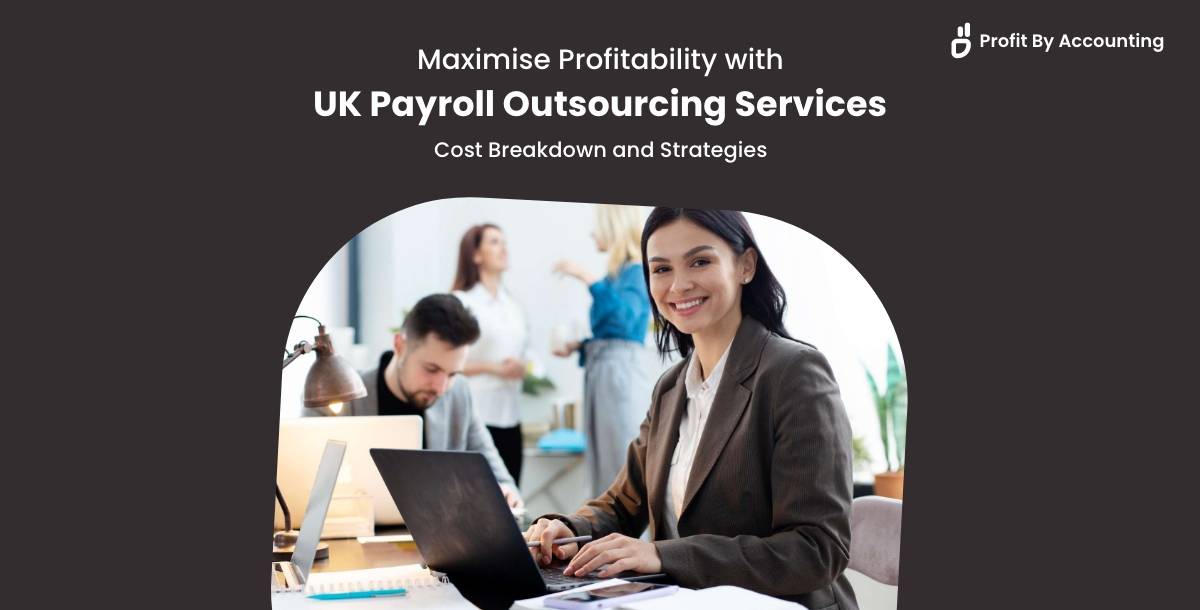Maximise Profitability with UK Payroll Outsourcing Services: Cost Breakdown and Strategies
Wed,30 Jul 2025 17:29:00- Font Size
- Share Content

Managing payroll can be a double‑edged sword for accountancy practices. On one hand, delivering accurate payroll and bookkeeping services cements client trust; on the other, repetitive administrative tasks eat into your margins. At Profit By Accounting, we believe the key to turning payroll into a profit centre lies in adopting the right outsourcing model—and understanding exactly how much Payroll Outsourcing Services will cost your firm. In this comprehensive guide, we’ll explore pricing structures, cost drivers, and best practices for integrating outsourced solutions with your tax and payroll services offerings.
Why Outsource Payroll? The Profit Potential
- Focus on High‑Value Advice
Handing off routine payroll tax calculations and payslip processing frees up your team to concentrate on strategic advisory, tax planning, and growth initiatives.
- Reduce Error‑Related Costs
Specialists trained in the latest UK payroll legislation minimise the risk of penalties.
- Scale Without Hiring Headcount
Whether you’re servicing five clients or fifty, per‑payslip models and volume discounts let you expand without the overhead of full‑time hires.
- Enhance Service Bundles
Combining payroll and bookkeeping services with tax and payroll services creates a seamless offering for SMEs, increasing retention and referral rates.
By integrating outsourced payroll, you sharpen your competitive edge and turn a traditionally low‑margin line into a revenue generator.
Understanding Payroll Outsourcing Models
Outsourcing partnerships typically adopt one of four models. Choosing the right one hinges on client complexity, payroll frequency, and your desired level of control.
Model Ideal For Cost Structure
Same Salary Model Simple pay rates, fixed monthly salaries Flat fee per payslip or per client
Variable Salary Model Part‑time, full‑time mix; multiple pay cycles Tiered per‑payslip; complexity surcharge
FTE Model Long‑term, high‑volume; dedicated accountancy needs Monthly retainer for a full‑time equivalent
Per‑Payslip Model Short‑term projects or seasonal payroll spikes Volume‑based sliding scale starting ~£4–6
No matter the choice, each model can be bundled with ancillary offerings—such as payroll and bookkeeping services—to deliver a robust end‑to‑end solution.
Key Cost Drivers for UK Payroll Outsourcing Services
Several factors influence the final price tag of Payroll Outsourcing Services. Below, we break down the most significant components:
1. Setup Costs
- Onboarding Fee: A one‑off charge for client configuration, typically starting from £10 per company.
- System Integration: If you require API or software integrations with existing bookkeeping tools, expect additional consultancy fees.
2. Per‑Payslip Charges
- Base Rate: Generally ranges from £4 to £6 per payslip.
- Volume Discounts: Many providers offer scaled pricing—paying £5 per slip for the first 100, then £4.50 beyond.
- Complexity Uplift: If employee benefits calculations, multiple pay frequencies, or overtime computations are needed, per‑payslip rates can rise by 10‑20%.
3. Auto‑Enrolment Services
Auto‑enrolment is now a regulatory must for UK employers. Outsourcers break this into three phases:
Stage Description Typical Fee
Initial Review Assess workforce eligibility and prepare documentation £15–£25 per client
Registration Submit enrolment data to pension providers £25–£35 per client (≤10 staff)
Compliance Run Monthly payslip‑level charges for each enrolled employee £0.75 per employee per run
By pitching tax and payroll services as a bundled add‑on, accountancy practices can enhance value while covering the incremental cost of auto‑enrolment.
4. Year‑End Filing
Ensuring HMRC compliance at year‑end is non‑negotiable:
- Final FPS/EPS Submission: Outsourcing firms often charge £20 per EYU (Employer Year‑end Update)—split into £10 setup and £10 processing.
Failing to submit on time can trigger penalties, making this nominal fee a worthwhile investment for accuracy and peace of mind.
Total Cost Example: A Mid‑Size Practice Case Study
Let’s illustrate the numbers with a hypothetical accountancy firm processing 200 payslips monthly, offering both payroll and bookkeeping services alongside standard accounting:
- Setup: 5 new client companies × £10 = £50
- Per‑Payslip: 200 payslips × £5 average = £1,000
- Auto‑Enrolment: 50 employees × £0.75 = £37.50 per run
- Year‑End Filing: 5 EYUs × £20 = £100
Total Monthly Cost: £1,187.50
If you package this within a tax and payroll services bundle priced at £1,500/month, you retain £312.50 profit—before factoring in your internal margins on bookkeeping add‑ons.
This example highlights how Payroll Outsourcing Services can shift from a cost centre to a profitable line item.
Integrating Outsourced Payroll with Bookkeeping and Tax Services
A seamless client experience demands tight coordination across payroll, bookkeeping, and tax compliance. Here’s how to integrate:
1. Unified Client Onboarding
Collect all necessary payroll data at the outset—benefits, pension contributions, starter declarations—alongside bookkeeping credentials.
2. Single‑Point Data Exchange
Use cloud platforms (e.g., Xero, QuickBooks) that support real‑time payroll tax calculations and feed general ledger entries directly into your bookkeeping workflow.
3. Combined Reporting
Offer monthly dashboards showing payroll tax liabilities, payslip summaries, and financial statement impacts. This transparency reinforces the value of your payroll and bookkeeping services.
4. Holistic Compliance Review
Schedule quarterly catch‑ups to audit RTI submissions, auto‑enrolment status, and VAT considerations—packaging it as an all‑inclusive tax and payroll services plan.
By branding a comprehensive suite—“Payroll Outsourcing Services + bookkeeping + tax advisory”—you can justify premium pricing and improve client stickiness.
Best Practices for Profitable Payroll Outsourcing
To maximise margins while delivering exceptional service:
- Leverage Tiered Pricing
Move clients from per‑payslip to FTE models as they grow—ensuring stable revenue.
- Automate Data Entry
Encourage clients to upload timesheets via portals or integrate biometric systems to reduce manual costs and errors in payroll tax calculations.
- Maintain Standardised Processes
Document workflows for every payroll cycle. Standardisation cuts provider fees and speeds onboarding.
- Upsell Value‑Added Services
Promote pension audits, CIS payment processing, and benefits administration as bolt‑ons to your core Payroll Outsourcing Services.
- Monitor Regulatory Changes
Stay current on National Insurance thresholds, IR35 reforms, and real‑time information (RTI) updates—areas where clients expect you to be the expert.
Common Pitfalls to Avoid
1. Underestimating Complexity
Variable pay, commissions, and statutory payments can explode costs if not scoped correctly.
2. Overlooking Hidden Fees
Integration charges, bespoke reporting, and rush submissions often incur extra fees—make sure contracts are transparent.
3. Poor Client Communication
Failure to explain tax and payroll services deliverables can drive dissatisfaction when fees are due.
4. Ignoring Volume Discounts
Aggregating client payslips across the firm can unlock lower per‑payslip rates—don’t let each client negotiate separately.
Measuring ROI: Beyond Cost Savings
While outsourcing slashes headcount and software expenses, the true ROI comes through:
- Revenue Growth
Reallocate team capacity to high‑margin advisory services and cross‑sell payroll and bookkeeping services.
- Client Retention
A hassle‑free payroll experience reduces churn—clients stick around longer when they don’t wrestle with HMRC.
- Risk Mitigation
Outsourced experts keep you compliant; avoiding even a single penalty can pay for months of fees.
- Scalability
As your practice lands larger clients, you can process thousands of payslips seamlessly—fostering exponential growth.
How to Choose the Right Payroll Outsourcing Partner
When vetting providers, assess:
- Industry Expertise
Do they specialise in accounting firms or serve a broad corporate base? Niche providers understand the nuances of payroll tax calculations.
- Service Level Agreements (SLAs)
Guarantee turnaround times, accuracy thresholds, and escalation pathways for errors.
- Technology Stack
Does the partner integrate smoothly with your existing bookkeeping and accounting platforms? A unified tech ecosystem reduces reconciliation work.
- Pricing Transparency
Look for clear per‑payslip, FTE, and ad‑hoc fees. Avoid providers who hide surcharges in “miscellaneous costs.”
- Client Support Model
Ensure dedicated account managers are available during peak filing periods, and that help desks understand UK legislation updates.
A rigorous selection process positions your firm to deliver premium Payroll Outsourcing Services without surprise expenses.
Implementation Roadmap
1. Scoping & Proposal
Catalog client payroll requirements—salary bands, pay cycles, benefits, and statutory deductions.
2. Pilot Phase
Trial with one or two clients to validate data flows, SLAs, and reporting templates.
3. Roll‑out
Migrate remaining clients in waves, providing clear timelines for data submission and go‑live dates.
4. Quality Assurance
Conduct parallel payroll runs for the first two months, comparing in‑house vs. outsourced outputs, with special attention to payroll tax calculations.
5. Ongoing Governance
Schedule quarterly performance reviews, SLA compliance checks, and client satisfaction surveys.
Conclusion
Outsourcing payroll is no longer an optional nice‑to‑have—it’s essential for modern accountancy practices aiming to maximise profitability. By understanding the pricing models, cost drivers, and best practices outlined above, you can craft competitive Payroll Outsourcing Services that drive margin growth and enhance client satisfaction. Remember: integrating payroll and bookkeeping services with tax and payroll services under a single umbrella not only simplifies operations but also positions your firm as a one‑stop financial partner.
Ready to transform your payroll into a profit generator? Explore our Payroll Outsourcing Services packages today and see how Profit By Accounting can help you scale smarter, comply faster, and earn more.
Frequently Asked Questions
Q1. How much do Payroll Outsourcing Services typically cost per company?
A. Most providers charge an initial setup fee starting around £10 per company, plus per‑payslip fees ranging from £4 to £6. Additional services like auto‑enrolment and year‑end filing incur separate charges.
Q2. Can I combine outsourced payroll with bookkeeping and tax services?
A. Absolutely—many accountancy practices bundle payroll and bookkeeping services with tax and payroll services to deliver comprehensive solutions, improving client retention and per‑client revenue.
Q3. What is the difference between the FTE model and the per‑payslip model?
A. The FTE model secures a dedicated full‑time expert at a fixed monthly retainer—ideal for high volume and long‑term needs. The per‑payslip model charges based on actual payslips processed, with volume discounts for larger runs.
Q4. How do outsourcing providers handle payroll tax calculations and compliance?
A. Outsourced specialists keep up to date with UK payroll tax legislation, perform real‑time information (RTI) submissions, calculate National Insurance and PAYE liabilities, and file year‑end updates to HMRC on your behalf.
Q5 Is there a risk of hidden fees when outsourcing payroll?
A. To avoid surprises, insist on full pricing transparency: understand setup costs, per‑payslip rates, complexity surcharges, and any extra fees for integrations or rush filings. A well‑structured SLA will outline all potential charges.
